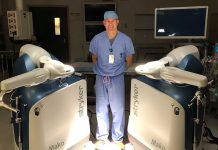The University of Tulsa’s Oxley College of Health & Natural Sciences honored Oklahoma’s first graduating class of certified registered nurse anesthetists (CRNAs) with a celebration ceremony Saturday, Aug. 5. TU’s three-year nurse anesthetist program began in 2020 in response to the critical need for trained professionals locally and regionally.
Fourteen doctoral candidates are moving from TU’s School of Nursing classrooms to hospitals, surgical centers, clinics and doctor’s offices to fill jobs that are in high demand. More than 150 well-qualified nurses from California to Kentucky have applied for the CRNA program that can only accept 20 new students each year.
“As anesthesia providers, they will play a crucial role in advancing health care and ensuring the well-being of our families, friends and neighbors. This esteemed program not only produces highly skilled nurse anesthetists but also contributes significantly to the health care profession, the local economy, and the overall quality of life in our community,” said Ron Walker, interim dean of Oxley College.
All 14 graduates were offered multiple career opportunities, and the majority have accepted jobs in Oklahoma.
Brittany Minor, a U.S. Navy reservist, moved to Tulsa from Dallas to attend TU. She worked in a hospital emergency room and then intensive care unit before applying for the CRNA program. She is now going to work with Hillcrest Healthcare System.
 “It’s been very exciting, challenging. I’m in awe of how the program has grown,” Minor said. “The faculty have been very flexible. I had a baby during the program, and they were very accommodating, very flexible, very understanding in whatever situation.”
“It’s been very exciting, challenging. I’m in awe of how the program has grown,” Minor said. “The faculty have been very flexible. I had a baby during the program, and they were very accommodating, very flexible, very understanding in whatever situation.”
Minor, who was on active duty in the Navy for several years, was able to use her veterans’ benefits to fund her education. In addition to working with faculty and administrators, she received support from TU’s McKee Veterans Success Center.
Cameroon native Lucien Ngochi arrived at TU from Houston. He became interested in advancing from a registered nurse to CRNA after his wife underwent an epidural during childbirth. Ngochi said he and his family have decided to stay in Tulsa where he wants to create the best experience possible for his patients during medical procedures.
Ngochi also said the nursing profession is an excellent career for men, despite the somewhat small number of male nurses. “I enjoy being a nurse. Your coworkers want you to succeed. They support you. They encourage you. So, you always want to be the best. And seeing all the male nurses in the TU program even makes it better because I feel like there’s a place in nursing for men,” he said. “I will never change my career path. I will always be a nurse, and I will encourage other men to join.”
TU values diversity and inclusion throughout its academics and strives to reflect the greater Tulsa community.
“It’s nice seeing people of color, people of different religions. With different people coming together with different beliefs to study, you learn different cultures,” said Beatrice Olorunnaiye, who received her bachelor’s degree in biochemistry from TU in 2013 before returning in 2020 to earn her CRNA. Olorunnaiye has accepted a job with Bailey Medical Center in Owasso and just wrapped up her clinical rotation in Claremore. She is eager to work with patients in rural areas who might not otherwise have access to procedures that require anesthesia.

“Anesthesia itself is an area where health care facilities need people. They need people everywhere. We have very few CRNAs around the country,” she said. “TU has really helped with the first program in all of Oklahoma. They give us access to different hospitals, so they know that there are new anesthesia providers coming into the job market.”
As of 2019, CRNAs were the sole anesthesia providers in 26 Oklahoma counties, with 32 counties having no anesthesia providers. During the past three years, rigorous didactic courses and simulation experiences prepared each graduate to complete over 2,400 hours of advanced practice clinical time and an average of 950 cases.
“I really want to be back at TU – possibly come back and be part of the faculty. That’s my dream,” Olorunnaiye said. “I like to teach. I like to talk to people. I like people learning from me, and I also like to learn from them. So, that’s my goal. And I just hope the program keeps growing.”
To learn more about all of the doctor of nurse practitioner programs available through TU’s Oxley College of Health & Natural Sciences, visit healthsciences.utulsa.edu/nursing/nursing-graduate-programs/.












